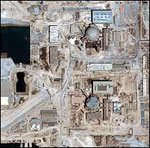 Los Angeles Times: The envoy says economic punishments have inflicted pain on Iran, but that there has been no signal from its leaders that they are willing to yield ground to relieve the international pressure.
Los Angeles Times: The envoy says economic punishments have inflicted pain on Iran, but that there has been no signal from its leaders that they are willing to yield ground to relieve the international pressure.
The Los Angeles Times
The envoy says economic punishments have inflicted pain on Iran, but that there has been no signal from its leaders that they are willing to yield ground to relieve the international pressure.
By Paul Richter, Los Angeles Times
 Reporting from Washington — Western powers’ strong new sanctions on Iran have so far failed to push Tehran’s leaders toward compromise on their disputed nuclear program, a senior European diplomat said Tuesday.
Reporting from Washington — Western powers’ strong new sanctions on Iran have so far failed to push Tehran’s leaders toward compromise on their disputed nuclear program, a senior European diplomat said Tuesday.
In a grim assessment, the official said that although the economic punishments clearly have inflicted pain on Iran, there has been no signal from the country’s leaders that they are willing to yield ground to relieve the pressure.
Though Iran officially has been calling for new talks on the issue, the diplomat said he had not seen a single statement to indicate a change in its leaders’ political views on the nuclear program. Instead, some voices within Iranian President Mahmoud Ahmadinejad’s government insist there is no way they will give ground and that “there is no need for a meeting,” he said.
Since the imposition of the latest sanctions, over the summer, “the whole question has been, ‘Is that going to create a new political situation?'” the diplomat told a group of reporters. “We haven’t seen anything yet.”
The official spoke on condition of anonymity because of the sensitivity of the issue.
Many countries believe Iran is pursuing its nuclear program to acquire the know-how to build weapons; the Iranian government insists it is interested only in peaceful nuclear projects.
In June, the United Nations Security Council imposed sanctions that focused on individuals and companies with ties to Iran’s nuclear and military programs. Later in the summer, the United States, the European Union, Canada, Australia, South Korea and other industrialized nations added tougher unilateral sanctions, which hit harder at Iran’s lucrative energy sector, its trade and ties to international finance.
By most accounts, Iran’s already-troubled economy has been further damaged by the sanctions.
Yet the impact has been reduced by the willingness of some countries — all of which objected to the unilateral sanctions — to keep doing some business with the Islamic Republic’s lucrative energy sector. These include China, Russia, Turkey, India and Brazil.
Iranian officials recently indicated that they were willing to restart talks on their nuclear program with world powers after Nov. 10, although key details remain unresolved.
The European diplomat said that in the last five years, Western attempts to negotiate with Iran have fallen into a fruitless pattern: Tehran will be coaxed to meet with foreign diplomats twice, but when a third meeting approaches, “it will all peter out.” So far, he said, it appears the latest proposed talks may follow the same routine.
The official said he saw no reason to believe that threats of Western military force would change Tehran’s thinking. Talk of the military option “hasn’t moved in any way the Iranian regime,” he said.
U.S. officials generally have been more optimistic about the prospects for negotiating, stressing that sanctions by the U.S., Europe and the United Nations have cut off financial and trade ties and hurt Iran’s energy sector.
The European diplomat said a group of world powers was still debating how to frame another long-discussed proposal, which would give Iran isotopes for medical treatments in its hospitals if it agreed to temporarily surrender part of its stockpile of nuclear material.
The goal would be to constrain Iran’s ability to build a nuclear weapon. But since the idea was first floated a year ago, Iran has continued to accumulate uranium, substantially increasing its supply.


